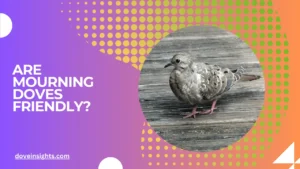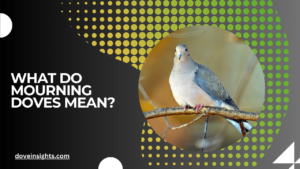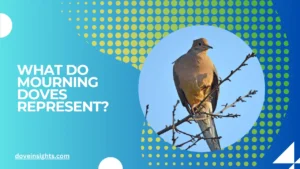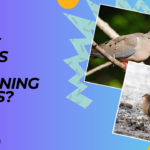When we think of pets, our minds often jump to cats, dogs, or even exotic birds like parrots.
But what about the gentle, graceful mourning dove? Known for its soothing coo and peaceful demeanor, the mourning dove has captured the hearts of many bird enthusiasts and nature lovers alike.
These birds, often seen perched on fences or in the trees, exude a sense of calm that many people find comforting. However, a common question arises: Can mourning doves be pets?
While they may seem like ideal candidates for companionship, the answer isn’t as simple as it seems. Mourning doves are wild birds, and their natural behaviors, needs, and instincts can present challenges when it comes to keeping them as pets.
From their dietary requirements to their need for freedom, mourning doves don’t necessarily fit the traditional mold of a domesticated pet. Yet, there is a fascination with the idea of bringing these beautiful creatures into our homes.
In this article, we’ll explore whether mourning doves can truly be kept as pets, the ethical considerations, and the challenges and rewards of living with one.
Whether you’ve encountered a mourning dove in your backyard or are simply curious about the possibility of adopting one, understanding their behavior and requirements is crucial before making any decisions. Let’s dive deeper into the world of mourning doves and determine if they make good pets.
Contents
- 1 Understanding Mourning Doves – Behavior and Characteristics
- 2 Ethical Considerations – Should Mourning Doves Be Kept as Pets?
- 3 The Practical Challenges of Keeping a Mourning Dove as a Pet
- 4 The Legalities of Keeping Mourning Doves as Pets
- 5 Alternatives to Keeping Mourning Doves as Pets
- 6 Conclusion:
- 7 FAQ’s
Understanding Mourning Doves – Behavior and Characteristics
Before considering whether mourning doves can be pets, it’s important to first understand their natural behavior and characteristics. Mourning doves (Zenaida macroura) are medium-sized birds known for their graceful appearance and distinctive cooing sound.
These birds are native to North America and are highly adaptable, thriving in a variety of environments, from rural landscapes to urban areas. Mourning doves are ground feeders, often seen foraging for seeds and grains, and they typically form monogamous pairs that mate for life.
In the wild, mourning doves exhibit a range of instinctive behaviors. They are migratory birds, which means they travel seasonally to find suitable climates and food sources.
Mourning doves are also incredibly skittish, easily startled by loud noises or sudden movements, which makes them somewhat challenging to keep in captivity. Their natural inclination to fly freely means that they are not naturally inclined to be confined to a cage.
These instincts are important to understand because they highlight some of the challenges of keeping a mourning dove as a pet.
Mourning doves are not domesticated like parrots or canaries, so they require more attention to their mental stimulation and environmental needs. Without the freedom they are accustomed to, they may become stressed or even suffer from health issues.
Ethical Considerations – Should Mourning Doves Be Kept as Pets?
While the idea of having a mourning dove as a pet might sound appealing, there are ethical considerations to take into account. Mourning doves are wild birds, and capturing or keeping them as pets can interfere with their natural life cycle and migration patterns.
In many regions, it is illegal to capture wild birds without the proper permits, as they are protected by wildlife conservation laws.
Even if you find a mourning dove that seems injured or abandoned, it’s essential to consult a wildlife rehabilitation center before attempting to care for it.
Mourning doves, like many wild birds, have specific dietary needs and environmental requirements that must be met in order for them to thrive in captivity. Simply taking them in as pets can be harmful to both the bird and the environment.
Additionally, keeping a mourning dove in captivity may cause emotional distress. These birds are social animals and often live in large flocks.
Isolating a mourning dove from other birds may lead to loneliness and behavioral problems. Before considering a mourning dove as a pet, it’s crucial to evaluate whether you can provide the environment that allows them to live according to their natural instincts.
The Practical Challenges of Keeping a Mourning Dove as a Pet
If you’re still considering keeping a mourning dove as a pet, there are several practical challenges to bear in mind. While mourning doves may not require the same level of interaction as a parrot or other pet birds, they do have very specific needs.
- Dietary Needs – Mourning doves primarily feed on seeds, grains, and some plant matter. Their diet is relatively simple, but it requires access to a constant supply of fresh food. It’s essential to provide a balanced diet to ensure they stay healthy.
- Space and Environment – Mourning doves are flighty and need ample space to move around. A small cage or enclosure will not provide the stimulation or freedom they need. Ideally, a mourning dove should have access to a large aviary or an enclosed outdoor space where they can fly short distances.
- Social Needs – As previously mentioned, mourning doves are social creatures. Keeping a single mourning dove as a pet may result in boredom and loneliness, as they are used to living in flocks. If you decide to keep a mourning dove, it may be best to consider adopting more than one.
- Health and Care – Mourning doves require regular care to ensure their health. While they are generally hardy birds, they are susceptible to certain illnesses, such as respiratory infections or digestive issues. They also need proper hygiene in their living environment to avoid the buildup of waste or bacteria.
The Legalities of Keeping Mourning Doves as Pets
Before considering keeping a mourning dove as a pet, it’s crucial to familiarize yourself with the legal regulations surrounding wild birds.
In many places, it is illegal to capture or keep mourning doves without the proper permits or licenses, as they are protected under federal and state wildlife laws.
In the United States, mourning doves are covered under the Migratory Bird Treaty Act, which makes it unlawful to capture, possess, or harm migratory birds without the appropriate permits. Violating these laws can result in hefty fines or legal consequences.
It’s important to remember that even if you find a mourning dove that appears injured or abandoned, it’s better to contact a licensed wildlife rehabilitator rather than attempting to care for it yourself. Wildlife professionals have the expertise and resources to ensure that the bird receives the proper care and is reintroduced to the wild when it’s ready.
In summary, while it might be tempting to take a mourning dove in as a pet, it’s essential to consider the legal and ethical implications before doing so.
Alternatives to Keeping Mourning Doves as Pets
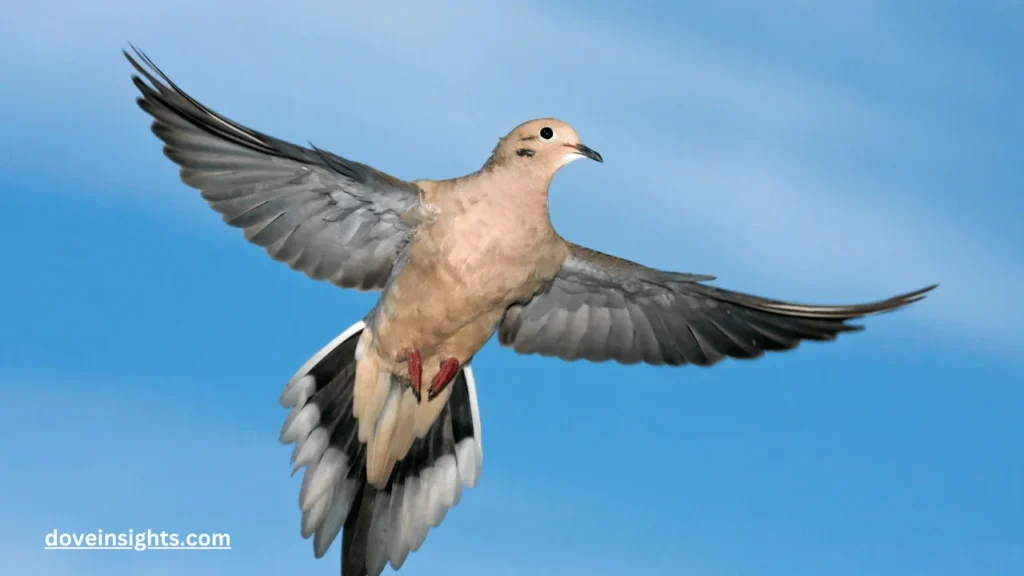
If you love the idea of having a mourning dove in your life but are hesitant to keep one as a pet, there are several alternatives to consider.
- Bird Watching – Mourning doves are common in many areas, and observing them in their natural habitat can be a rewarding experience. By setting up bird feeders or creating a bird-friendly garden, you can attract mourning doves and other wild birds to your yard without the need for captivity.
- Adopt a Domesticated Dove – If you’re set on having a dove as a pet, consider adopting a domesticated dove from a rescue organization or sanctuary. These doves have been bred and raised in captivity, making them more adaptable to life as a pet.
- Volunteer with Wildlife Rehabilitation – If you’re passionate about helping mourning doves and other wild birds, consider volunteering with a wildlife rehabilitation center. This will allow you to care for and learn about these birds in a way that supports their well-being and conservation.
By exploring these alternatives, you can still connect with mourning doves while respecting their natural behaviors and legal protections.
Conclusion:
The idea of keeping a mourning dove as a pet may be appealing due to their gentle nature and beautiful appearance. However, mourning doves are wild birds with unique needs and instincts that make them unsuitable as traditional pets.
The ethical and legal considerations, combined with the practical challenges of providing proper care, suggest that mourning doves are best appreciated in their natural environment.
If you’re captivated by these peaceful creatures, consider alternatives like bird watching, adopting a domesticated dove, or volunteering with wildlife organizations. By doing so, you can enjoy the company of mourning doves while respecting their natural behaviors and ensuring their well-being.
FAQ’s
Can mourning doves be kept as pets?
While it’s technically possible to keep mourning doves as pets, it’s not recommended due to their wild nature and specific care requirements. They are better suited to life in the wild or in large aviaries.
Are mourning doves legal to keep as pets?
In many places, mourning doves are protected under the Migratory Bird Treaty Act, and it’s illegal to capture or keep them without proper permits.
What do mourning doves eat?
Mourning doves primarily feed on seeds, grains, and plant material. A balanced diet is essential to their health in captivity.
Do mourning doves need a lot of space?
Yes, mourning doves need plenty of space to fly and roam. They are not suited for small cages or confined spaces.
Can mourning doves live alone?
Mourning doves are social animals and prefer to live in pairs or groups. Keeping a single dove may cause loneliness.
What do I do if I find an injured mourning dove?
If you find an injured mourning dove, contact a wildlife rehabilitator rather than attempting to care for it yourself.


